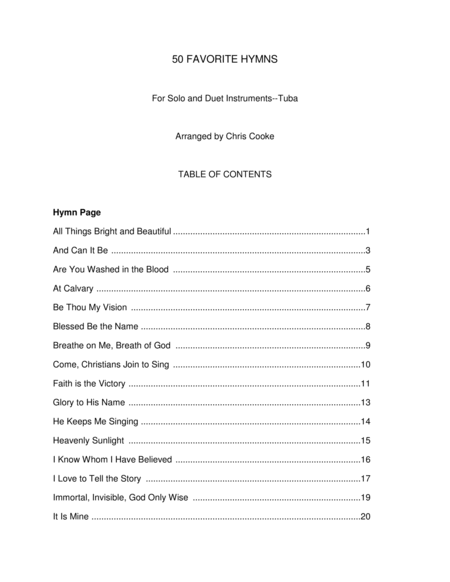Tuba Solo - Digital Download SKU: A0.865253 Arranged by Chris Cooke. Christian,Gospel,Praise & Worship,Sacred. Individual part. 65 pages. Chris Cooke #3603527. Published by Chris Cooke (A0.865253). 50 Favorite Hymns for Solo and Duet Instruments is a sequel to the first book, Hymns for Solo and Duet Instruments. This second collection contains my all-time favorites and is written for early-mid-intermediate players. The hymns are written so that instruments can be mixed and matched for duet or ensemble purposes. Suitable for worship services, they can be played as offertories or special music selections, or as accompaniment to congregational singing. Many of the hymns are in the traditional hymnal keys, however, there are some that may be slightly lower to accommodate instrumental ranges. This tuba book contains only the melody of these hymns. One verse and chorus is written for each and can be repeated as needed. Hymns with a particular theme or key can be combined for a medley, e.g. I Love to Tell the Story, Oh How I Love Jesus, and He Keeps Me Singing-all are in A-flat. Melody and duet parts are available for flute/oboe, clarinet/trumpet, alto sax, French horn, and trombone/baritone/bassoon. When necessary, parts occasionally cross for ease of playing for the bass instruments. A piano accompaniment book is also available. These accompaniments are eclectic in style and span the gamut from classical to gospel. The hymns with their concert keys are: All Things Bright and Beautiful, alternate tune, C And Can It Be, F Are You Washed in the Blood, G At Calvary, C Be Thou My Vision, E-flat Blessed Be the Name, A-flat Breathe on Me, Breath of God, F Come Christians, Join to Sing, E-flat Faith is the Victory, E-flat Glory to His Name, G Heavenly Sunlight, F He Keeps Me Singing, A-flat I Love to Tell the Story, A-flat Immortal, Invisible, God Only Wise, A-flat It Is Mine, B-flat Jesus Saves, F Joy Unspeakable and Full of Glory, A-flat Just As I Am, E-flat Leaning on the Everlasting Arms, A-flat Like a River Glorious, F Love Lifted Me, B-flat My Faith Looks Up to Thee, D Nothing But The Blood, A-flat Oh How I Love Jesus, A-flat On Jordan’s Stormy Banks, E-flat Praise Him! Praise Him! F Redeemed, How I Love to Proclaim It! A-flat Rejoice, The Lord Is King! C Revive Us Again, F Rock of Ages, B-flat Send the Light, F Since I Have Been Redeemed, F Since Jesus Came into My Heart, F Softly and Tenderly, F Stand Up, Stand Up for Jesus, G Standing on the Promises, B-flat Sunshine in my Soul, F The Old Rugged Cross, B-flat There is Power in the Blood, B-flat There Shall Be Showers of Blessing, B-flat The Solid Rock, F This is My Father’s World, E-flat To God Be the Glory, G Trust and Obey, F We Gather Together, B-flat When the Roll is Called Up Yonder, G When We All Get to Heaven, C Wonderful Grace of Jesus, B-flat Wonderful Words of Life, F
